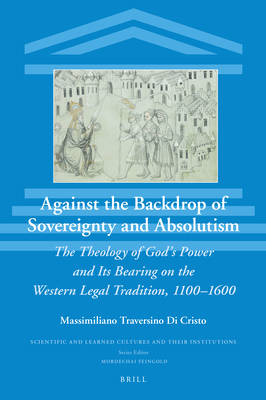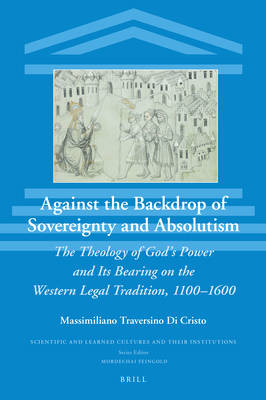
- Afhalen na 1 uur in een winkel met voorraad
- Gratis thuislevering in België vanaf € 30
- Ruim aanbod met 7 miljoen producten
- Afhalen na 1 uur in een winkel met voorraad
- Gratis thuislevering in België vanaf € 30
- Ruim aanbod met 7 miljoen producten
Zoeken
Against the Backdrop of Sovereignty and Absolutism
The Theology of God's Power and Its Bearing on the Western Legal Tradition, 1100-1600
Massimiliano Traversino Di Cristo
€ 215,45
+ 430 punten
Omschrijving
With a foreword by Diego Quaglioni
This book attempts to determine the degree to which the modern fate of the Western legal tradition depends on one of the most long-standing debates of the Middle Ages, the distinction between potentia Dei absoluta and ordinata (God's absolute and ordered power). The mediaeval investigation into God's attributes was originally concerned with the problem of divine almightiness. It underwent a slow but steady displacement from the territory of theology to the freshly emerging proceedings of legal analysis. Here, based on the distinction, late-mediaeval lawyers worked out a new terminology to define the extent of the power-holder's authority. This effort would give rise, during the early modern era, to the gradual establishment of the legal-political framework represented by the concepts of the prince and sovereignty.
This book attempts to determine the degree to which the modern fate of the Western legal tradition depends on one of the most long-standing debates of the Middle Ages, the distinction between potentia Dei absoluta and ordinata (God's absolute and ordered power). The mediaeval investigation into God's attributes was originally concerned with the problem of divine almightiness. It underwent a slow but steady displacement from the territory of theology to the freshly emerging proceedings of legal analysis. Here, based on the distinction, late-mediaeval lawyers worked out a new terminology to define the extent of the power-holder's authority. This effort would give rise, during the early modern era, to the gradual establishment of the legal-political framework represented by the concepts of the prince and sovereignty.
Specificaties
Betrokkenen
- Auteur(s):
- Uitgeverij:
Inhoud
- Aantal bladzijden:
- 256
- Taal:
- Engels
- Reeks:
- Reeksnummer:
- nr. 34
Eigenschappen
- Productcode (EAN):
- 9789004503694
- Verschijningsdatum:
- 12/05/2022
- Uitvoering:
- Hardcover
- Formaat:
- Genaaid
- Afmetingen:
- 155 mm x 235 mm
- Gewicht:
- 553 g

Alleen bij Standaard Boekhandel
+ 430 punten op je klantenkaart van Standaard Boekhandel
Beoordelingen
We publiceren alleen reviews die voldoen aan de voorwaarden voor reviews. Bekijk onze voorwaarden voor reviews.











